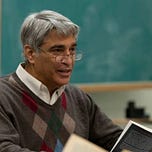Today’s poetry selections invite further consideration of the word “because,” our Word of the Week. And they also call to mind the beginning of Lent next week.
Suppose you are a boy in a British boarding school, whose front promenade is lined with beautiful old pear trees. There’s a rule against picking them. You can gather up any of the windfall, but pear trees aren’t the strongest trees in the world, so that the headmaster has told all the boys in no uncertain terms that they must stay off the branches. But you are hare-brained and young, you haven’t had anything to eat since lunch, and nobody’s looking. So you climb the tree, and — crack! — a limb heavy with pears breaks. Because you were too heavy for the limb, it broke. Because here describes just how matter behaves. There’s no decision in the result. Because you jumped into the pool, you got wet. Because you tossed a lighted match onto dry leaves, they began to burn. The water, the fire, the leaves, and the limb of the pear tree simply act as they must.
Of course, there was a different kind of because in your decision to climb the tree. You knew that the limbs were fragile. You do not wish that any of them should break under your weight, but you do strangely will it, since you know what the possible and direct result of your action may be. Now let us suppose that the schoolmaster asks you whether you know who broke the limb. He suspects you, because he’s seen you skate close to the brink of the rules before, and he’s also seen you hanging about that tree. You tell a lie. You deny it. But it turns out that someone has seen you, after all, and then the jig is up.
The master says, “Because you have lied to my face, son, I cannot treat you as a boy of honor, and because you broke the rules, you must suffer a penalty.” Those uses of because are different from the first. The punishment is in the master’s choice: nothing forces his hand, unless it is a regard for honor and order. Quid pro quo, as they’d say in old Rome, or tit for tat, as we’d say in Chicago, or Wurst wider Wurst — sausage for sausage, as they used to say in Frankfurt! But what about when he says that he cannot trust you? There, your untrustworthiness is inherent to what you’ve done. It isn’t exactly as if the master decides, independently, not to trust you. Your action itself has broken the trust.
Don’t worry, I’m getting round to our Poem of the Week!
Now suppose your name is Augustine, and you’re a teenage boy on leave from school, with too much time on your hands, and along with some other scapegraces you steal the pears from a neighbor’s tree, even though you aren’t hungry, and the pears aren’t very good. You get away with it. Or do you? Can you? In the act itself, you set yourself against charity and against truth, even though God has made you to thrive upon truth, to crave it, to love it, to enjoy it. So because you do the petty and vicious thing, you harden your heart against its own life. Because you lie and cheat, you begin to make yourself a liar and a cheat. This time, there is no interval between the action and the consequence. God has so made the world that sin punishes itself, in the doing of it. But a similar thing is true of acts of love, and truth, and beauty. We shouldn’t think that God says, “Because you humble yourself, I will get around to exalting you,” since the act of humility is itself divine: you draw nearer to God by drawing nearer to God, the God who deigned to create this marvelous world of things that are not God, from the most glorious angel to the precious and glinting speck of dust.
Now consider the because in these two portions of speeches from Paradise Lost. In the first, we have the Father speaking to the Son, and foretelling his resurrection and ascension. In the second, the Son is speaking to Adam. Notice that in neither case does Milton have the speaker say, “I will decide to do this, because you did that.” It’s rather as if what happens must be so by virtue of the act. What do you say?
Because thou hast, though throned in highest bliss Equal to God, and equally enjoying Godlike fruition, quitted all to save A world from utter loss, and hast been found By merit more than birthright Son of God, Found worthiest to be so by being good Far more than great or high; because in thee Love hath abounded more than glory abounds, Therefore thy humiliation shall exalt With thee thy manhood also to this throne; Here shalt thou sit incarnate, here shalt reign Both God and Man, Son both of God and Man, Anointed universal King....... ....Because thou hast hearkened to the voice of thy wife, And eaten of the tree concerning which I charged thee, saying, Thou shalt not eat thereof, Cursed is the ground for thy sake, thou in sorrow Shalt eat thereof all the days of thy life; Thorns also and thistles shall it bring thee forth Unbid, and thou shalt eat the herb of the field, In the sweat of thy face shalt thou eat bread Till thou return unto the ground, for thou Out of the ground wast taken, know thy birth, For dust thou art, and shalt to dust return.
Listen to this episode with a 7-day free trial
Subscribe to Word & Song by Anthony Esolen to listen to this post and get 7 days of free access to the full post archives.












